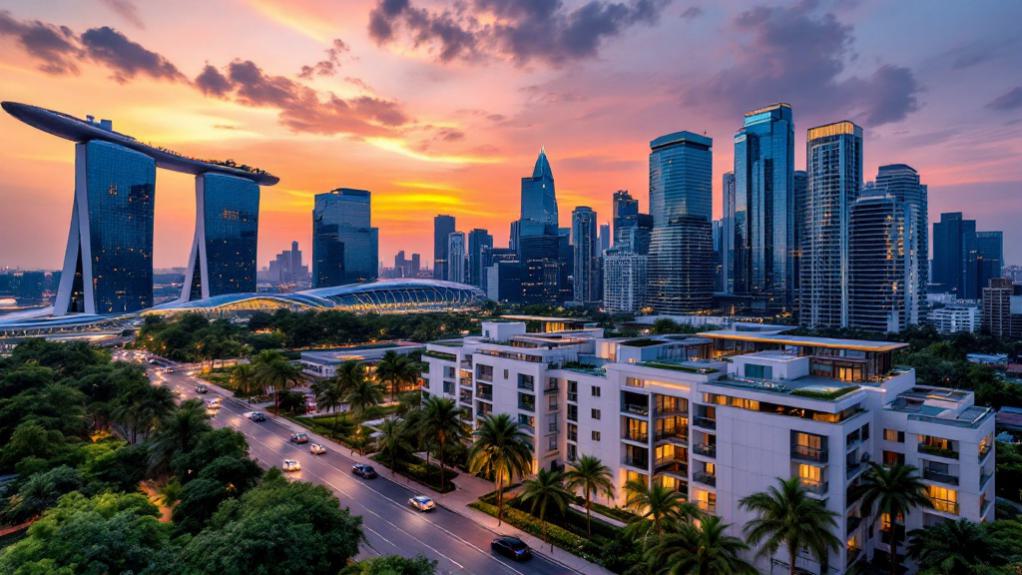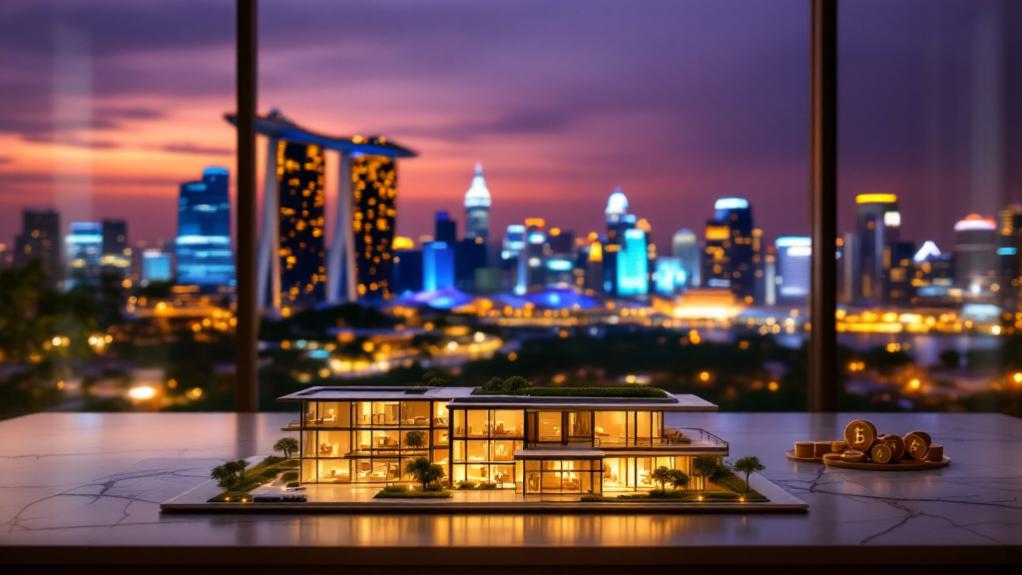Singapore’s real estate market balances public housing (HDB) and private residential options within a meticulously regulated framework. Foreign investors face specific restrictions, including Additional Buyer’s Stamp Duty and Total Debt Servicing Ratio requirements. Post-pandemic trends show preference for larger spaces and smart home technology, while investment opportunities exist in both direct ownership and REITs. Despite limited land availability (728 square kilometers), the market maintains stability through government cooling measures designed to guarantee sustainable growth amid environmental challenges. Further exploration reveals nuanced strategies for maneuvering this dynamic property landscape.

While many global property markets have experienced significant fluctuations over the past decade, Singapore’s real estate sector has maintained its position as one of the world’s most robust and meticulously regulated markets. The city-state’s property landscape comprises a strategic mix of public housing, managed by the Housing & Development Board (HDB), and private residential options including condominiums, apartments, and landed properties such as bungalows and terrace houses.
Singapore’s real estate sector stands as a beacon of stability through its dual approach to housing and meticulous regulatory framework.
This dichotomy, overseen by regulatory bodies like the Urban Redevelopment Authority (URA), guarantees housing accessibility across socioeconomic segments while maintaining market stability.
Singapore’s property ownership structure features both 99-year leasehold and freehold tenure systems, with distinct regulatory frameworks governing each category. Foreign investors face restrictions on certain property types, particularly landed properties and HDB flats, and must navigate Additional Buyer’s Stamp Duty (ABSD) requirements, which impose supplementary taxes on property purchases.
Concurrently, the Total Debt Servicing Ratio (TDSR) framework limits borrowing capacity, guaranteeing financial prudence among buyers in this high-value market.
Recent market trends reflect evolving preferences, with post-pandemic demand shifting toward larger living spaces and properties with smart home technology integration. The interest rate environment significantly impacts buyer financing decisions and overall market liquidity. The residential segment continues to dominate the real estate landscape with 62% market share while maintaining stable pricing trends. Property hotspots have emerged in suburban areas, driven by infrastructure development and changing work arrangements.
The investment landscape offers varied opportunities, from rental yield optimization in residential sectors to participation in Real Estate Investment Trusts (REITs), which provide alternative entry points to the property market with lower capital requirements. Properties in the Core Central Region tend to command premium prices but offer prestigious addresses and potential for significant capital appreciation.
Despite its strengths, Singapore’s real estate market faces structural challenges, including limited land availability in a nation of just 728 square kilometers and the implications of an aging demographic profile on housing demand patterns.
Environmental considerations, particularly rising sea levels potentially affecting coastal properties, represent emerging concerns for long-term property valuation. The government’s cooling measures, implemented periodically to prevent market overheating, reflect Singapore’s ongoing commitment to balancing market dynamism with sustainable growth and housing affordability.
Frequently Asked Questions
What Is the Resale Levy for HDB Flats?
The resale levy is a fixed sum payable when selling a subsidized HDB flat to purchase another subsidized property from HDB or an Executive Condominium.
Implemented in 2006, the levy ranges from S$15,000 for 2-room flats to S$50,000 for Executive flats, with singles paying half these amounts.
This mechanism guarantees equitable distribution of public housing subsidies by reducing subsidies for second subsidized flat purchases, and cannot be financed through CPF funds.
How Does the Ethnic Integration Policy Affect Property Purchases?
Singapore’s Ethnic Integration Policy (EIP) greatly impacts property transactions by establishing ethnic quotas for HDB blocks and neighborhoods.
When quotas are reached, sellers can only transact with buyers from eligible ethnicities, potentially reducing the buyer pool for minority sellers. This restriction may extend selling timeframes and occasionally decrease selling prices.
The policy, affecting approximately one-third of HDB blocks, requires prospective buyers to verify quota eligibility before proceeding with purchases, as eligibility status is updated monthly.
Can I Use CPF to Pay for Property Taxes?
No, CPF funds cannot be utilized to pay for property taxes in Singapore.
The Central Provident Fund specifically excludes property taxes from eligible expenses, along with other recurring costs such as monthly service and conservancy charges, property agent fees, furniture purchases, and rental deposits.
While CPF can be used for significant property-related expenses including down payments, mortgage installments, stamp duties, legal fees, and limited renovation costs, property taxation remains an expense that must be paid through alternative financial means.
Are Foreigners Allowed to Own Landed Properties in Singapore?
Foreign ownership of landed properties in Singapore is generally prohibited under the Residential Property Act, with exceptions requiring explicit approval from the Singapore Land Authority.
To qualify, foreigners must be Permanent Residents for at least five years and demonstrate exceptional economic contribution to Singapore.
Approvals are granted on a case-by-case basis with strict conditions, including owner-occupation requirements, five-year selling restrictions, and prohibition against property subdivision.
Sentosa Cove represents a notable exception where foreigners may purchase landed homes with approval.
What Are the Cooling Measures Currently in Place?
Singapore’s current property cooling measures encompass four primary mechanisms:
- Additional Buyer’s Stamp Duty (ABSD) with rates up to 60% for foreigners.
- Loan-to-Value (LTV) limits restricting mortgage financing to 75% for first properties and less for subsequent purchases.
- Total Debt Servicing Ratio (TDSR) capping debt obligations at 55% of monthly income.
- Seller’s Stamp Duty (SSD) imposing taxes of 4-12% on properties sold within three years of acquisition.





